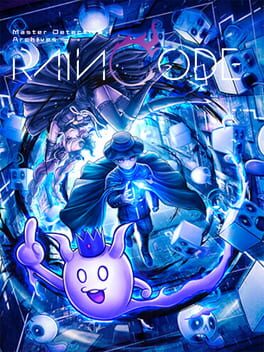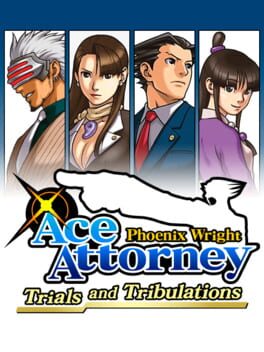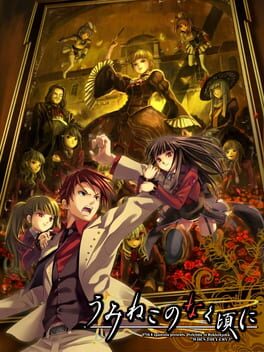LunaP
5 reviews liked by LunaP
NieR Re[in]carnation
2021
Gameplay is basically non-existent (and through that at least slightly less painful than Drakengard 1 /hj), music is great though the OST lacks in variety. Biggest strength is definitely the design of the cage, which constantly blew me away, despite its simplicity.
But sadly this game consists of more than just walking along those beautiful corridors: it wants to tell a story as well - or at least it tries to, while it often feels like it doesn't REALLY want to. Characters, one of the biggest strengths in previous games, are one-dimensional and mostly disappear into the background aside from their individual weapon stories that make up about half of the game: and they're barely any more interesting than the weapon stories in previous games, just now stretched out over an entire chapter each. Predictable at best, hilarious at worst. The rare good idea is quickly suffocated by the extremely stilted presentation.
The main story of Sun and Moon, the second story arc, was the only part of the game I felt went in actually interesting directions, conceptually. The story between the two siblings still mostly falls flat for me in the end, but telling this story from two, intertwining perspectives was a short glimpse of an interesting idea - something that could've been turned into a proper story for a proper game.
Then the final arc, The People and the World, comes along, with a "power of friendship" main story, carried entirely by tons of lore drops that make all the TRUE NieR fans go "WOOOAH, LORE!!!". Because this IS the real NieR 3 after all - how could you disagree, when it has all this incredibly """important""" lore that answers all these questions? At least, that's the sentiment I've seen online recently, one that might just be the final nail in the coffin towards my alienation from the NieR-community.
Here's the thing: what defines the "importance" of this game within the series? Sure, it answers tons of questions, it confirms so many of the theories I had for almost 10 years… but at some point, I just had to ask myself: "so what?". I was really invested in the lore of this series for the longest time. And now all this buildup for all these grand mysteries lurking in the background, carefully planted over the course of multiple games: it all culminates in the answers being thrown in my face in between the actual plot. All this LORE barely matters to the events of the actual story, much less so to the characters themselves. They just accidently stumble into documents and glorified flashback sequences and go "wow, I have no idea what any of this means", just so players can go "YOOO, THAT'S THE THING FROM DRAKENGARD!!!".
I think at some point many fans of the series have stopped to understand what made Yoko Taro's games so special, and why he handled world building the way he did. Over the years, I've seen more and more people complain about how the lore is "too spread out" across different types of media, and how all of it should've just been in the games themselves instead. But no: those details and backstories weren't originally left out of the games to get on people's nerves and sell more books and manga: you think anyone bought those before Automata became the success that it was? You think this was all planned out as a clever marketing strategy? No, those details were left out because THEY DIDN'T MATTER. The lore was always hinted at, there was always this certain air of intrigue to how big and incomprehensible the DrakeNieR multiverse really is. Instead, the games focused on the characters inhabiting that world - never understanding it fully, much like us.
I always loved crafting theories around the lore because it was this hidden background element: something I had no chance of ever fully grasping. First and foremost, however, I was there for the stories Yoko Taro decided to tell. That becomes all the more obvious, now that we get a game in the series he didn't direct - one he only supervised to make sure it stays accurate to the lore, while an entirely new team of writers came up with the actual, individual character stories.
This is the result: paper thin vignettes drenched in lore. So much new knowledge, yet so little value. I never cared less about what the world of NieR might have left to offer.
But sadly this game consists of more than just walking along those beautiful corridors: it wants to tell a story as well - or at least it tries to, while it often feels like it doesn't REALLY want to. Characters, one of the biggest strengths in previous games, are one-dimensional and mostly disappear into the background aside from their individual weapon stories that make up about half of the game: and they're barely any more interesting than the weapon stories in previous games, just now stretched out over an entire chapter each. Predictable at best, hilarious at worst. The rare good idea is quickly suffocated by the extremely stilted presentation.
The main story of Sun and Moon, the second story arc, was the only part of the game I felt went in actually interesting directions, conceptually. The story between the two siblings still mostly falls flat for me in the end, but telling this story from two, intertwining perspectives was a short glimpse of an interesting idea - something that could've been turned into a proper story for a proper game.
Then the final arc, The People and the World, comes along, with a "power of friendship" main story, carried entirely by tons of lore drops that make all the TRUE NieR fans go "WOOOAH, LORE!!!". Because this IS the real NieR 3 after all - how could you disagree, when it has all this incredibly """important""" lore that answers all these questions? At least, that's the sentiment I've seen online recently, one that might just be the final nail in the coffin towards my alienation from the NieR-community.
Here's the thing: what defines the "importance" of this game within the series? Sure, it answers tons of questions, it confirms so many of the theories I had for almost 10 years… but at some point, I just had to ask myself: "so what?". I was really invested in the lore of this series for the longest time. And now all this buildup for all these grand mysteries lurking in the background, carefully planted over the course of multiple games: it all culminates in the answers being thrown in my face in between the actual plot. All this LORE barely matters to the events of the actual story, much less so to the characters themselves. They just accidently stumble into documents and glorified flashback sequences and go "wow, I have no idea what any of this means", just so players can go "YOOO, THAT'S THE THING FROM DRAKENGARD!!!".
I think at some point many fans of the series have stopped to understand what made Yoko Taro's games so special, and why he handled world building the way he did. Over the years, I've seen more and more people complain about how the lore is "too spread out" across different types of media, and how all of it should've just been in the games themselves instead. But no: those details and backstories weren't originally left out of the games to get on people's nerves and sell more books and manga: you think anyone bought those before Automata became the success that it was? You think this was all planned out as a clever marketing strategy? No, those details were left out because THEY DIDN'T MATTER. The lore was always hinted at, there was always this certain air of intrigue to how big and incomprehensible the DrakeNieR multiverse really is. Instead, the games focused on the characters inhabiting that world - never understanding it fully, much like us.
I always loved crafting theories around the lore because it was this hidden background element: something I had no chance of ever fully grasping. First and foremost, however, I was there for the stories Yoko Taro decided to tell. That becomes all the more obvious, now that we get a game in the series he didn't direct - one he only supervised to make sure it stays accurate to the lore, while an entirely new team of writers came up with the actual, individual character stories.
This is the result: paper thin vignettes drenched in lore. So much new knowledge, yet so little value. I never cared less about what the world of NieR might have left to offer.
Signalis
2022
Shu Takumi decides writing characters with depth and ideas with meaning is for losers and proceeds to write the most pretentious meaningless shlock ever while also being actively offensive about it. The presentation is cool I guess. Probably my least favorite game ever.
Note: If someone thinks they can convince me this is as good as everyone says it is, I AM willing to listen.
Note: If someone thinks they can convince me this is as good as everyone says it is, I AM willing to listen.
Umineko: When They Cry is a love letter to the mystery fiction genre with a ridiculous amount of ambition behind it. The way it sets up its central mystery makes for some of the most entertaining twists and tricks mystery stories have to offer, but this all gets put in a new light when the story gets meta, fully deconstructing and examining the tropes it uses. Its themes don't just stop at metafiction, though. Umineko also explores topics such as child abuse, the nature of love, the subjectivity of truth, and even discusses systemic misogyny with astounding respect and sensitivity for a 2007 video game. Umineko has changed my life in a way I'll never forget, and it truly deserves to be called the best fiction of all time.
![NieR Re[in]carnation](https://images.igdb.com/igdb/image/upload/t_cover_big/co7bm4.jpg)



